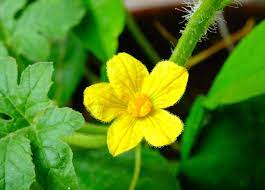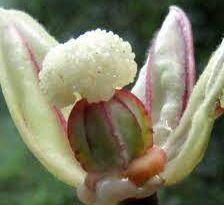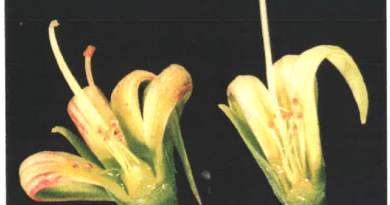Economic Importance, Uses, and By-Products of Watermelon Male flowers
Watermelon (Citrullus lanatus) is a vine-like flowering plant that produces separate male and female flowers on the same plant. The male flowers of watermelon are typically smaller and less conspicuous compared to the female flowers, which develop into the fruit.
Watermelon male flowers are generally small and grow on long, slender stalks known as peduncles. They have a tubular shape and are typically yellow in color. The flower itself consists of several parts.
Male flowers typically have five petals arranged in a star-like pattern. These petals are thin and delicate, and they may have a slightly fringed or serrated edge.
The anther is the pollen-producing part of the flower. It is typically yellow and contains pollen sacs that hold the pollen grains. The anthers release the pollen, which is essential for fertilizing the female flowers and initiating fruit development.
Watermelon male flowers produce abundant pollen, which is powdery and yellowish in color. Pollen grains are responsible for the transfer of genetic material from the male flower to the female flower, enabling pollination and subsequent fruit formation.
Male flowers typically bloom earlier than female flowers to ensure that the pollen is readily available when the female flowers become receptive. However, individual male flowers have a relatively short lifespan, usually lasting only a few days before wilting and falling off the plant.
It’s worth noting that while male flowers play a crucial role in pollination, they do not develop into fruits themselves. Instead, it is the female flowers that produce the watermelon fruits after successful pollination and fertilization.
Economic Importance, Uses, and By-Products of Watermelon Male flowers

Watermelon male flowers, also known as staminate flowers, serve several economic purposes and have various uses. Here are some of the economic importance and uses of watermelon male flowers:
1. Pollination: Male flowers play a crucial role in pollinating female flowers, which is essential for fruit development and seed production. Bees and other pollinators transfer pollen from male flowers to female flowers, ensuring successful fertilization and fruit set.
2. Hybrid seed production: Male flowers are often used in hybrid seed production. In this process, the male flowers from one variety (the male parent) are used to pollinate the female flowers of another variety (the female parent). The resulting fruits will contain hybrid seeds that possess desirable traits from both parent plants.
3. Genetic improvement: Breeders can select male flowers with specific characteristics, such as disease resistance, improved flavor, or better yield, to use in breeding programs. By carefully choosing male parents, breeders can introduce desirable traits into new watermelon varieties.
Read Also : Economic Importance, Uses, and By-Products of Watermelon Flowers
4. Edible flowers: Male flowers of watermelon are edible and can be used in culinary applications. They have a mild flavor and can be added to salads, soups, or used as a garnish. The flowers can also be stuffed, battered, and deep-fried to create a unique and visually appealing dish.
5. Medicinal and therapeutic uses: In traditional medicine, watermelon male flowers have been used for their potential medicinal properties. They are believed to possess diuretic properties, help in reducing blood pressure, and act as a natural remedy for urinary tract infections.
6. Ornamental value: Watermelon male flowers have aesthetic appeal and can be used for decorative purposes. They can be used in floral arrangements, table centerpieces, or as an addition to bouquets, adding a touch of natural beauty.
Examples: Watermelon farmers may introduce beehives or encourage wild pollinators in their fields to ensure effective pollination of female flowers by male flowers, resulting in a higher yield of fruits.
7. Seed : companies may collect pollen from selected male flowers to produce hybrid watermelon seeds, which can then be marketed to farmers looking for improved crop characteristics.
Restaurants and gourmet food stores might use watermelon male flowers as an exotic ingredient in culinary creations, adding a unique touch to their dishes.
Herbal medicine practitioners may use watermelon male flowers in the preparation of herbal remedies, either as a standalone ingredient or as part of a medicinal blend.
8. Value-added products: Watermelon male flowers can be processed into various value-added products. For instance, they can be dried and used as an ingredient in teas or herbal infusions. Extracts from male flowers can also be used in the production of cosmetics, skincare products, or natural dyes.
9. Export potential: In regions where watermelon cultivation is a significant economic activity, male flowers can contribute to export opportunities. Dried male flowers or value-added products made from them can be exported to countries where there is a demand for culinary or medicinal ingredients, providing income and market expansion for producers.
10. Alternative food source: In some regions or during certain periods, watermelon male flowers can serve as an alternative food source during times of scarcity or food shortages. The edible flowers can be consumed directly, offering nutritional value and sustenance.
11. Local markets and festivals: Watermelon male flowers can be sold in local markets or featured in festivals and events celebrating local agriculture. This can promote community engagement, support local farmers, and create a unique selling point for regional produce.
12. Educational and research purposes: Male flowers of watermelon can be used in educational settings and research institutions to study plant biology, reproductive processes, and breeding techniques. They provide a practical and accessible resource for teaching and scientific exploration.
13. Livestock feed: In some cases, watermelon male flowers can be used as a feed ingredient for livestock, such as poultry or rabbits. This can help diversify feed sources and provide an additional use for male flowers.
14. Nutrient-rich compost: Male flowers, like other plant parts, can contribute to composting efforts. They contain organic matter that, when composted, can enrich the soil with nutrients. Farmers and gardeners can collect male flowers along with other organic materials to create nutrient-rich compost, which can be used to improve soil fertility and promote healthy plant growth.
15. Value-added products for the food industry: Male flowers can be processed into value-added products specifically targeted for the food industry. For example, extracts or distillates from male flowers can be used as flavorings, natural food colorings, or additives in the production of beverages, confectioneries, or other food products. These products can enhance the taste, aroma, and visual appeal of various food items.
16. Sustainable packaging material: Researchers and innovators are exploring the use of natural materials in sustainable packaging alternatives. Male flowers, with their fibrous structure, can be considered as a potential resource for developing biodegradable packaging materials. By extracting fibers from male flowers, it may be possible to create eco-friendly packaging solutions that reduce reliance on non-biodegradable materials.
17. Art and crafts: Male flowers can inspire creativity in various art forms and crafts. Their intricate and delicate structures make them suitable for floral arrangements, pressed flower art, and even jewelry-making. Artists and crafters can incorporate dried or preserved male flowers into their creations, offering unique and visually appealing products for sale.
18. Agrotourism and farm experiences: Farms that cultivate watermelons can incorporate male flowers into their agrotourism activities. Visitors can learn about the importance of male flowers in the watermelon production process, participate in pollination demonstrations, or engage in hands-on experiences like harvesting male flowers or making floral arrangements. This diversifies revenue streams for farmers and provides educational and recreational opportunities for tourists.
These uses and examples highlight further economic opportunities and creative uses for watermelon male flowers, showcasing their potential beyond the primary roles of pollination and seed production.
Products and By-products That Can Be Derived From Watermelon male flowers
Watermelon male flowers are typically not consumed directly as a food item, but they can be utilized in various ways to create products or by-products. Here are some examples:
1. Pollen: Male flowers produce pollen, which is rich in proteins and can be harvested and used in the food industry. It can be used as a natural food coloring, a nutritional supplement, or even as an ingredient in certain recipes. For example, pollen can be used to enhance the flavor and nutritional content of baked goods or added to smoothies for added protein.
2. Bee Pollen: Watermelon male flowers are a source of pollen that can be collected by bees. Bee pollen is highly nutritious and is often used as a dietary supplement due to its high protein content. It can be consumed directly or used as an ingredient in energy bars, granola, or other health products.
Read Also : 9 Ways to Fatten Up your Pigs the Right Way
3. Bee Propolis: Bees collect resin from watermelon male flowers and other sources to produce propolis, a sticky substance used in the construction and maintenance of their hives. Propolis has antimicrobial and antioxidant properties and can be harvested by beekeepers. It is used in various health products like throat sprays, ointments, and dietary supplements.
4. Honey: While male flowers do not produce nectar, bees visiting watermelon flowers can collect nectar from female flowers and other nearby flowering plants. The resulting honey may have a mild watermelon flavor if the bees predominantly visit watermelon flowers. This honey can be consumed as a sweetener, spread, or used in cooking and baking.
5. Seeds: Male flowers do not develop watermelon fruits directly, but their pollen is necessary for fertilizing female flowers. When the fruits mature, they contain seeds that can be harvested and used for consumption or for growing new watermelon plants. Watermelon seeds can be roasted, ground into flour, or used as an ingredient in snack bars, trail mixes, or baked goods.
6. Compost: Once the male flowers have completed their reproductive cycle and are no longer viable, they can be composted. Composting involves the decomposition of organic materials, including plant matter, to produce nutrient-rich compost. The resulting compost can be used as a soil amendment to improve soil fertility and structure, benefiting other plants in the garden.
7. Floral Extracts: Watermelon male flowers possess a distinct aroma. By extracting the essential oils or fragrances from the flowers, floral extracts can be created. These extracts can be used in perfumes, soaps, lotions, candles, or other cosmetic and personal care products.
8. Bioactive Compounds: Watermelon male flowers contain various bioactive compounds such as phenolic compounds, flavonoids, and antioxidants. These compounds have potential health benefits and can be extracted for use in dietary supplements, herbal medicines, or natural remedies.
9. Natural Dyes: The vibrant yellow color of watermelon male flowers can be utilized to create natural dyes. The flowers can be boiled or soaked in water to extract the color, which can then be used for dyeing fabrics, yarns, or even as food coloring for certain dishes.
10. Plant-based Insecticides: Extracts from watermelon male flowers may possess natural insecticidal properties. These extracts can be formulated into plant-based insecticides, which can be used in organic farming or gardening to control pests and insects.
11. Animal Feed: While watermelon male flowers are not typically consumed directly by humans, they can be used as a nutritious feed for livestock or poultry. The flowers can be dried, ground, and incorporated into animal feed formulations to provide additional nutrients and dietary diversity.
12. Decorative Crafts: Watermelon male flowers can be dried and used in decorative crafts, such as potpourri, floral arrangements, or wreaths. Their unique shape and color can add a touch of natural beauty to various artistic creations.
13. Aromatherapy: The aromatic properties of watermelon male flowers can be harnessed for aromatherapy purposes. The flowers can be dried and used in potpourri, sachets, or essential oil blends to create a calming and refreshing fragrance that promotes relaxation and well-being.
14. Cosmetics and Skincare: Extracts from watermelon male flowers can be incorporated into cosmetic and skincare products. Their beneficial compounds, such as antioxidants and moisturizing properties, can be utilized in the formulation of facial cleansers, toners, creams, or masks to nourish and revitalize the skin.
15. Tea: Watermelon male flowers can be dried and used as an ingredient in herbal teas or infusions. They can provide a unique flavor profile and may offer potential health benefits when consumed as part of a tea blend.
16. Natural Fertilizer: Watermelon male flowers, along with other plant materials, can be composted to create nutrient-rich organic fertilizers. These fertilizers can be used to nourish plants in gardens, farms, or potted plants, promoting healthy growth and productivity.
17. Botanical Extracts: Watermelon male flowers contain various bioactive compounds that can be extracted and used in the formulation of botanical extracts. These extracts can be incorporated into skincare products, dietary supplements, or functional foods, offering potential health benefits and natural plant-based solutions.
18. Biofuel Production: Some research suggests that watermelon male flowers, along with other agricultural residues, can be utilized for biofuel production. Through processes such as fermentation or anaerobic digestion, the organic matter from the flowers can be converted into biofuels like biogas or bioethanol.
19. Floral Water: The distillation of watermelon male flowers can produce floral water or hydrosols. Floral water is a by-product of the essential oil extraction process and can be used in skincare, cosmetics, or as a fragrant ingredient in various products.
20. Plant-based Paper: Watermelon male flowers, along with other plant fibers, can be processed to create plant-based paper. The fibers can be extracted and used in the papermaking industry to produce eco-friendly and sustainable paper products.
These are some of the products and by-products that can be derived from watermelon male flowers. Each has its own unique properties and potential uses in various industries, including food, health, and agriculture.
These porducts and by-products further demonstrate the versatility and potential applications of watermelon male flowers beyond their primary reproductive function. It’s worth noting that the commercial viability and feasibility of some of these applications may vary, and further research and development may be required for their implementation on a larger scale.
Read Also : Efficient Solutions for Food Waste Disposal









